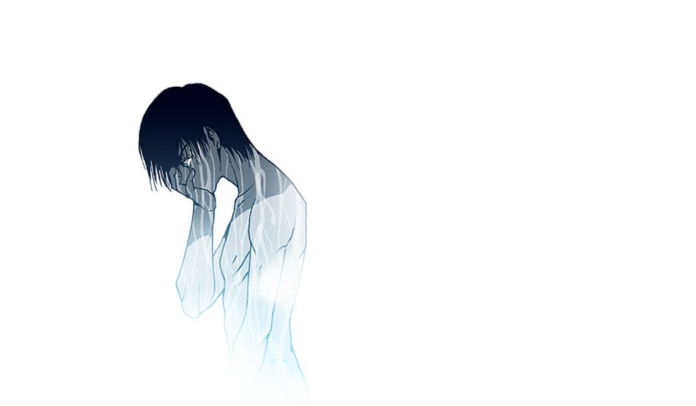Alien Idol
Writer/Artist: JIAE
Translation: Jim Park
Typesetting: Zaneh K.
Localization Team Lead: Hayden Robel
Translation Team Lead: Kristianna Lee
Typesetting Team Lead: Alex Culang
Quality Control: Jade Law, Peter Law
Platform: Tapas
Publication Date: December 20, 2019
Rating: Teen
Genre: VSC (Korea), Drama, Science Fiction, Entertainment Industry, LGBTQA+
Rie is an alien on the run after the destruction of her home planet Rama. When she and her peers escape to Earth, they are teleported directly into the bedroom of SJ Entertainment’s president Sunji Oh. Oh offers them language lessons and a place to stay. In return, Rie and company must sing and dance as part of the idol group AI with three other humans. There’s just one problem: AI is a male idol group, and Rie (an adolescent, “sexless” alien who identifies as female) must pretend to be a man. What might she and the alien survivors of Rama make of a prejudiced planet like Earth?
Alien Idol sets itself apart from other Korean comics in a number of ways. Rather than the expected full color, the artist JIAE utilizes just black, white and varying shades of blue. Her paneling de-emphasizes the flowing structure of other Korean artists in favor of static shots that break down events into moment-by-moment reaction shots. Her characters, meanwhile, have the long limbs and androgynous features of 90s shojo comics artists such as CLAMP. Alien Idol is thus distinctly “manga-esque” compared to other Korean comics of its type.
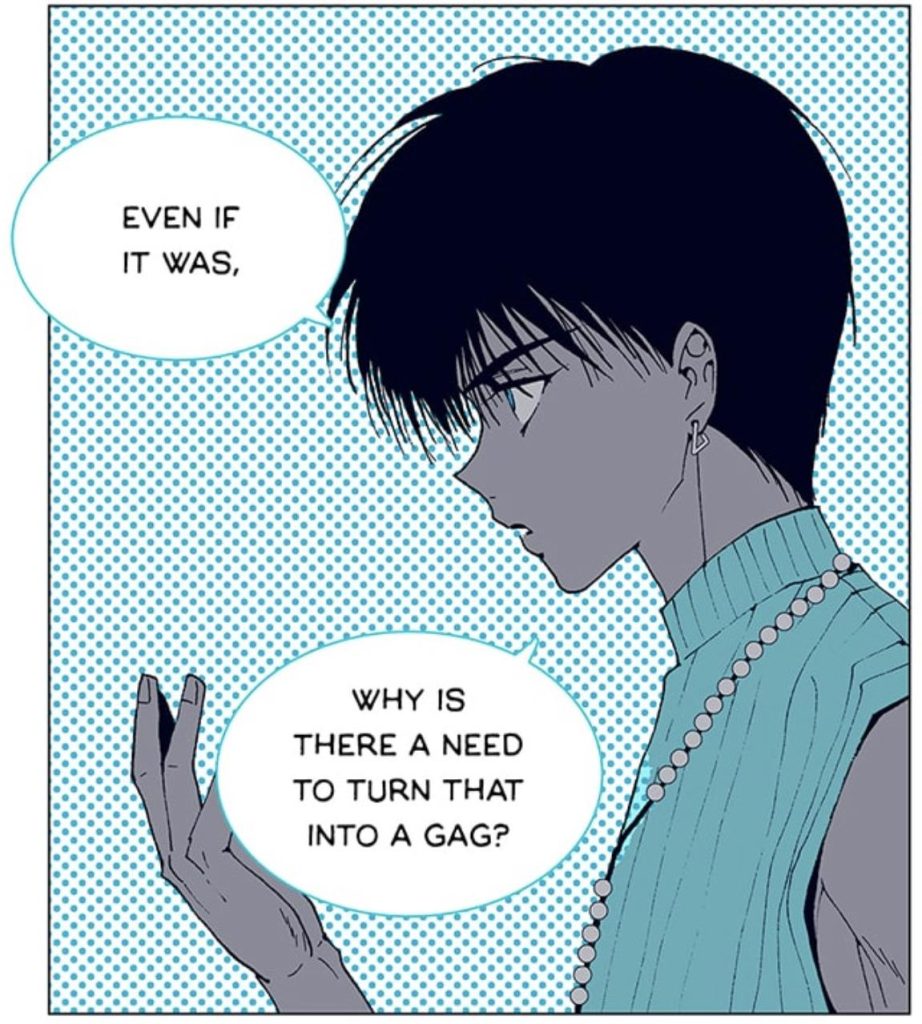
Across the Stars
Alien Idol also sets itself apart from its peers through topic and theme. In just the second chapter, Rie challenges a producer on variety television who wants her to speak bad Korean as a joke. “If making fun of foreigners is your idea of humor,” she says, “I’d much rather not take part in any of this nonsense.” That’s just the tip of a story that addresses such topics as colorism, fatphobia, queer identity, rape culture and (once again) South Korean feminism.
The alien biology of the Raman people complicates everything further. Without a special hormone shot, “sexless” Ramans don’t develop as men and women until they turn 29. That is, of course, unless they regularly swap spit with somebody they love, which changes their body to whatever sex their partner prefers. Rie’s Raman peer Shu declares that they will become a man as soon as possible in order to spread Raman progeny across earth. But is that really the best way? Their fellows Aiina and Ruka, too, have their own ideas.
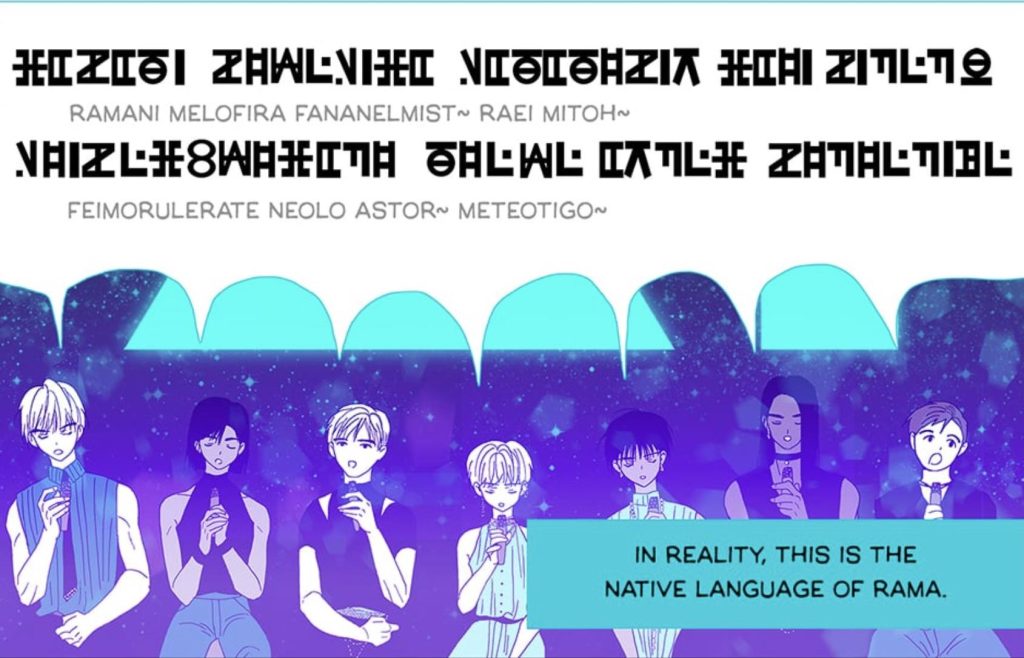
Dream Generation
Alien Idol at its best reminds me of Reiko Shimizu, the manga artist behind such works as Moon Child and Himitsu: Top Secret. Shimizu is a fearless storyteller who always shoots for the stars whether or not she can stick the landing. Moon Child in particular includes both incredible ideas (a Little Mermaid retelling featuring psychic salmon from space!) and truly horrid ones (perhaps the single most racist depiction of a black person in 90s manga.) But even though Shimizu can be hit or miss, her work is proof of shojo manga’s range and thematic flexibility.
JIAE’s work is similarly ambitious. Whole chapters are devoted to explaining the nuances of Raman biology. The characters talk frankly about their sexuality and preferences, which even they don’t always fully understand. In the meantime, AI transforms from a simple boy band into a social engine designed to smash Earth’s prejudices in pursuit of a better world. My personal favorite connection between Alien Idol and shojo classics, though, are the hilarious names of the aliens. Fans of Aslan Calanreese and Leopard Solid, meet Keen Rie Medlight and friends.
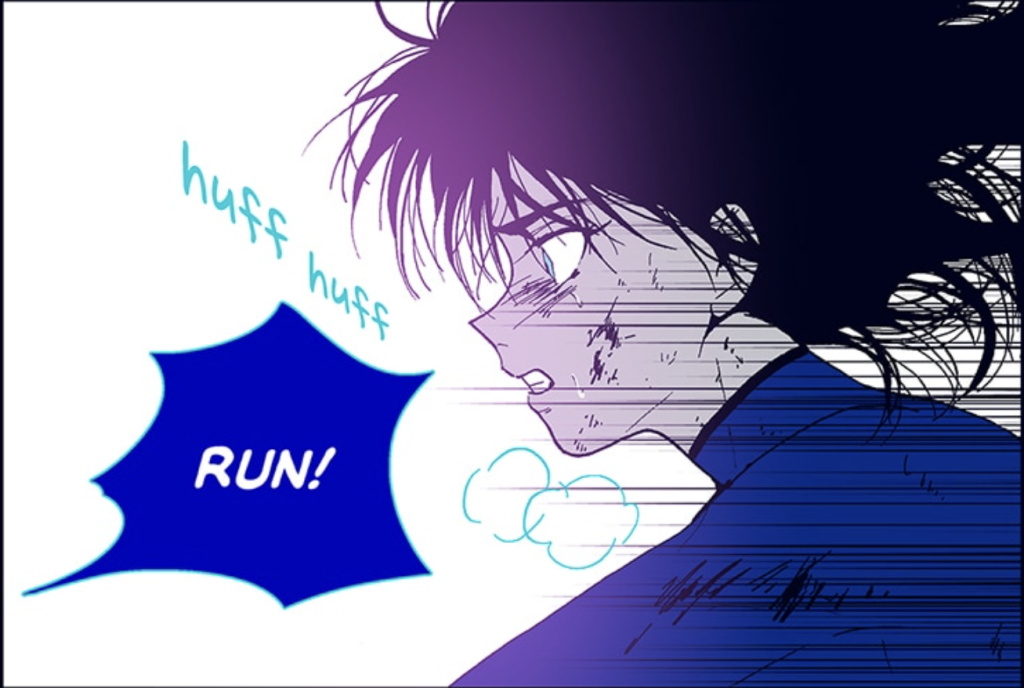
Blue Flash
Rie is the heart of Alien Idol. She’s strong, assertive and can do a wild backflip. She’s also marked by tragedy; androids killed her birth parents, and her boyfriend Road was captured by Rama’s killers en route to Earth. Rie is empowered by her male alias but also made deeply uncomfortable by it. Her friend Haeyon, from the girl group Rasberry, sees her as a man and desires her for it. Even Rie’s AI colleague Jiho can’t help but question his sexuality after rooming with her for months. As much as Rie wants to be seen for who she is, everybody on Earth (whether or not they are aware of it) keep forcing her into an “alien” role.
There’s plenty of potential here. But having read the whole series, I think that Rie might actually be Alien Idol’s weak point. She’s so good at everything she does–dancing, fighting, leading a societal movement for gender equality–that nothing ever fazes her. You never worry for her safety as you do with other shojo heroes like Banana Fish’s Aslan Callenreese. As a result, storylines in Alien Idol typically come down to Rie and her friends coming up with a plan and then executing it without much room for failure or improvisation.
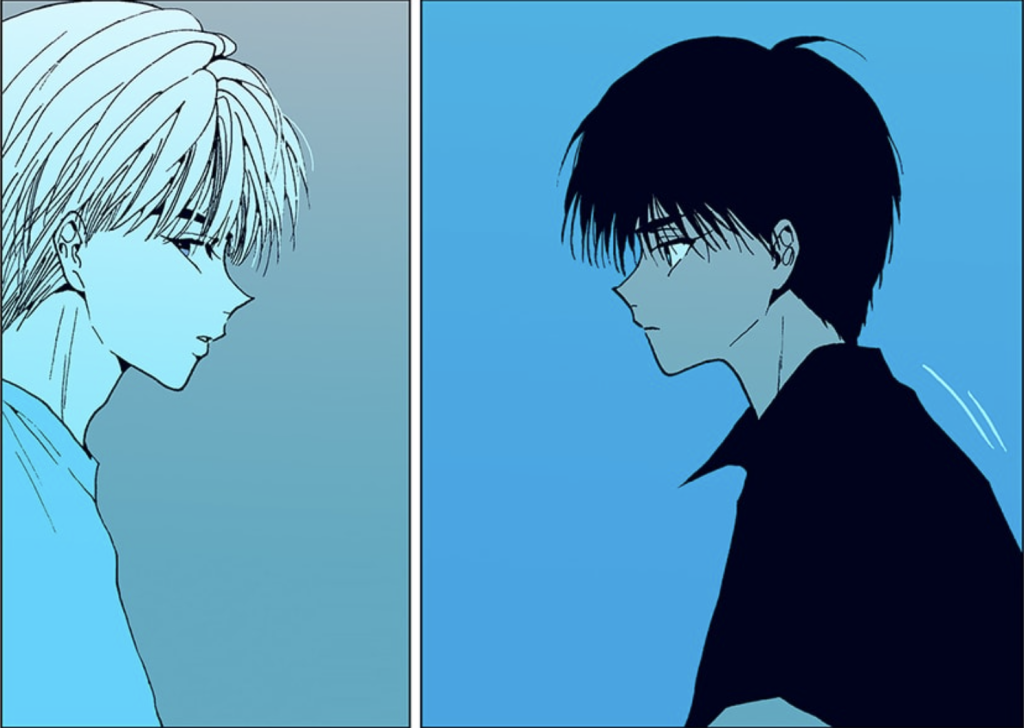
Who Feels Love?
Hayeon and Jiho are much more dynamic characters. Hayeon in particular has the best arc; she develops over a hundred chapters from a young woman frustrated by what Korea’s entertainment industry demands of women, to a confident leader transforming that industry from the inside. Jiho, meanwhile, has family trauma which blows up in his face at the comic’s halfway point. His evolving relationship with Rie, which forces him to read up on terms like gender dysphoria on the fly, also leads to some great scenes.
Shu, the aforementioned alien set on Raman reproduction, is another fun character. They remind me a bit of Rin/Shion from the shojo series Please Save My Earth. In short, they’re a little stinker who can’t quite be classified as a hero or a villain. Shu is the most dynamic of the Ramans and so is the most entertaining to follow. I can’t say the same of Aiina or Ruka, who are both well-adjusted and a bit boring. In fact, whether human or alien, the rest of Alien Idol’s side cast are interchangeable. They lack the presence to counterbalance Rie’s gravitational pull.
![social media post reads: [MUSIC CITY] RIE OF AI & THE BACKFLIP THAT DEFIES THE LAW OF PHYSICS](https://kcomicsbeat.com/wp-content/uploads/2024/09/chrome_HGePgsRysF-1024x760.png)
Life on Earth
Alien Idol’s villains also can’t help but come up short. They work perfectly well as representatives of social misogyny. In fact, JIAE’s depiction of misogyny as it manifests in Korea (as seen through fictional social media posts and pictures seeded throughout the comic) is always on-point. But JIAE’s approach works best in the abstract. Any time they switch from abstract to specific, introducing an abusive father or boyfriend, that character always lacks dimension. They only ever read as generic objects for Rie and her friends to react against.
Alien Idol’s formal chops start to wear thin after a hundred chapters or so. JIAE struggles to draw action. Their characters can be interchangeable; it doesn’t help that the cast features at least three important “handsome androgynous blond men.” Flashbacks recycle past panels, to the point that the reader might scroll past a dozen copy-paste panels before reaching new material. The highly decompressed vertical paneling does not help the pacing.
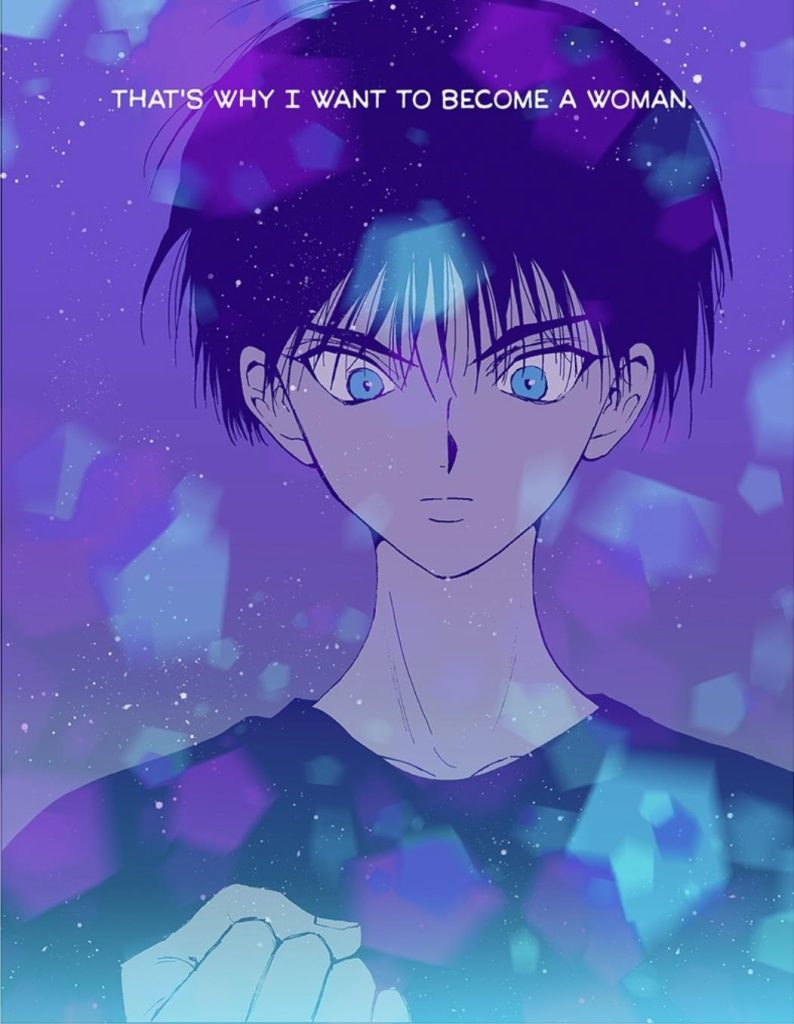
When the Light Rises
To be fair to JIAE, they claim in the author’s note that they did not hire assistants while producing Alien Idol. Even with the comic’s many hiatuses, it’s an incredible feat that they managed to produce over a hundred episodes all by themselves. It also might explain its shortcomings. Despite its ambition, Alien Idol can’t help but come off as the author rambling for multiple chapters about their specific theoretical interests. It works when JIAE manages to connect these ideas to whatever is happening on the page. But when the ideas aren’t clearly articulated, or fail to engage with the characters beyond the surface, Alien Idol fails.
Alien Idol, then, is an admirable experiment. I can’t say that it’s completely successful. But it does have me curious to check out JIAE’s other series, such as Deep Blue on Manta. There’s a distinct artistic vision here I want to see explored further.

